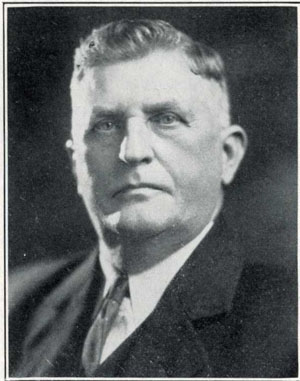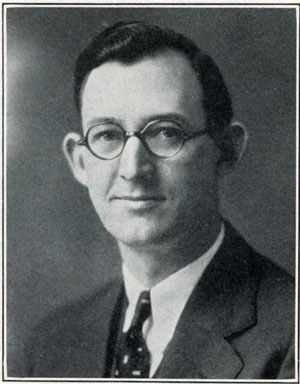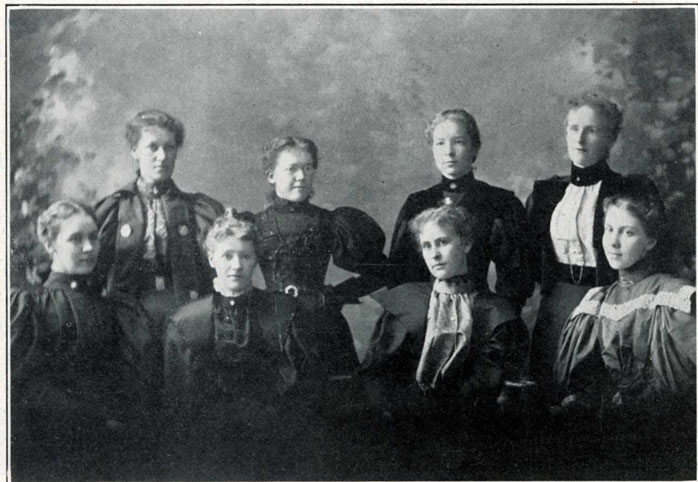 |
 |
Page 1 | Page 2 | Page 3 | Page 4 | Page 5 | Page 6 | Page 7 | Page 8 | Page 9 | Page 10 | Page 11 | Page 12 | Page 13 | Page 14 | Page 15 | Page 16 | Page 17 | Page 18 | Page 19 | Page 20 | Page 21

TRUSTEES (Reacting Left to Right)
Seated: George H. Nelson, H. R. Anderson, W. O. Johnason, Chairman; T. Aho Standing: Victor Johnson, Rueben Sandell, H. J. Anderson
[Page
17] Golden Jubilee—Messiah Lutheran Churchnot escape the feeling that those who particularly favored the project painted it in rosy colors and made it appear easy. Perhaps that was necessary in order to get a hearing for it. Mr. J. L. Johnason and Mr. Nils Flodin were commissioned to secure a suitable plan for the house. But it was specified that the plan should be free of charge and the house was to cost only from $1000.00 to $1800.00. Thus it appears that the main consideration of the church was to secure a cheap house. As a matter of fact, however, when all the work was done, it was found that the cheapest was the most expensive, for when the house was completed and the contractor turned it over to the congregation, several items in the building were not satisfactory, and these became the cause of a continued outlay of money for some time.
It had taken a long time to gather sufficient money to start the parsonage, and it took some more time before the debt contracted had been fully paid. Much of the money for the building was raised through coffee parties, which seem to have been as popular in those days as they are now among us.
Another interesting thing in connection with the building of the parsonage is brought out by two decisions made at successive meetings. The first one was made on May 4th, 1892, creating a committee to raise money for the building by subscriptions among the members of the church, but also among all the Scandinavians and the Americans. The second one was made at the next meeting, Sept. 27th, specifying that the plans should be submitted to Scandinavians only for bids. A certain exclusiveness is reflected here, which still clings to us entirely too much, and which in its worst aspects approaches downright selfishness.
With the beginning of Rev. Johnsson's ministry, the congregation entered a new period. Rev. Johnsson was a church disciplinarian, and laid much stress upon internal policies. The minutes of the meetings of the Board of Deacons during these years are most significant for interpreting the spirit of the church at that time. There was evident a desire on the part of both pastor and deacons to keep in close touch with the private life of every member of the church, and, as far as possible through admonition, warning, and instruction, to keep members on the path of righteousness, safeguard them against the moral pitfalls of the times and keep them loyal to the church. And so we find item after item in the minutes of these meetings dealing with persons, members of the church. Most often decisions have to do with adjustments of the financial relations between member and congregation, remitting here. reducing dues there, putting on the free list in one case, striking out in
Golden Jubilee—Messiah Lutheran Church [Page 18]
another. Sometimes the items thus handled in a single meeting will run into the thirties.
But most significant are such cases as, for instance, where two young girls are summoned before the Board of Deacons for participation in the work of the Salvation Army. After being reprimanded, one of them most emphatically announces that she is going to remain active in the Army, and is therefore summarily excommunicated. The other one, stating that she has not yet decided in her own mind whether she will work with them, is given further time to repent. Or the case where man and wife are summoned because they are not living together. Neither one appears before the Board, so a committee is appointed to immediately visit them, bringing to each of them a written copy of the Board's decision to excommunicate them unless they repent and live together as behooves man and wife. This treatment does not seem to help, and after re-instating the man, and giving the wife honorable dismissal, the Board comes to the conclusion that even this does not do any good, and finally goes on record as follows: "Since it has been found impossible to help this case, in spite of patience and friendly but serious admonition, be it resolved that the treatment of this case be discontinued, and that all be left in the hand of God, who alone can act in this matter."
Without commenting upon the merits of this type of church work during the years when it was practiced, it is proper to note that since this time a good deal more emphasis has begun to be placed on reaching out for the unchurched, in order that through the church they might be led to a more intimate fellowship with the Saviour, and less stress is laid culling out those from the church, who are not walking "worthily of the calling." There is no doubt that among the members of the church, the authority of the pastor and the Board of Deacons was respected, and perhaps feared, more in those days than is now the case.
Rev. Johnsson was an organizer, and everybody was made busy in the interest of the church. The Young People's Society was started February 11, 1892, and while there was little support for it to begin with, Rev. Johnsson succeeded year after year in gathering more of the young around its ideals and programs. On April 6, 1893, the Sewing Society was divided into two groups, the older and the younger, thereby increasing its efficiency and stimulating interest. Music and singing received much encouragement during Johnsson's pastorate. He took every opportunity to further high ideals in music and consistently condemned dance music and drinking songs. It was during this time that
[Page 19] Golden Jubilee—Messiah Lutheran Church
the church boasted a very fine Ladies Double Quartette, and besides the regular choir, there was for a time a male chorus also. The abundance of musical talent with which the Messiah Lutheran always has been blessed, and the upswing in musical activity experienced lately, are, without a doubt, due in a large measure to the influence and musical idealism of pastors and pastors' wives, who have served our church. Besides Rev. Johnsson, should be mentioned, Rev. Linder, Mrs. Lundgren, Rev. C. H. Nelson. Messiah has been fortunate in having musical enthusiasts in the parsonage.
Another function in the church which ranked high in importance with Rev. Johnsson was the religious instruction of the children. Especially did he hold up as the ideal that every child in the congregation should attend Daily Vacation Swedish School. Year after year, in his pastoral reports, he gives the number of children in the congregation and the number who attended the school, and then, with almost monotonous regularity he asks: "Where were then the 26 ?" or the 35, or whatever number failed to attend that year. When the elected Sunday School Superintendent in 1896 refused to serve, the pastor found it necessary himself to assume the duties of Superintendent. Still the Sunday School grew, and many of the present members of Messiah received their religious training during these strict times of Rev. Johnsson's ministry. Their instruction in "Swede School" and in the Confirmation class has stood them in good stead.
In the fall of 1899, Rev. Johnsson resigned after seven years of work. The growth of the church, numerically during these years, was not particularly large, but there is no doubt that solid foundations had been laid in ideals, morals, traditions, and policies. The pastor himself in his reports says that he noticed improvements in the morals of the people, even though he still found reason to complain of drinking, dancing, card playing, parties of a questionable type, profanity, jealousy, slander. Financially, also, these years were difficult in the church of God. There was a general financial depression all over the country. And yet, the parsonage was built during these years, and the work was carried on with vigor and earnest zeal.
When Rev. Johnsson left, he took with him as his wife, one of the daughters of the congregation, formerly Miss Armida Wilhelmina Bergh. Mrs. Johnsson came from a family that always stood close, to the pastors. Her father, Mr. John Bergh, was an untiring worker in the church, where he served in various capacities, and on account of the genial hospitality of Mrs. Bergh, the Bergh home was very often the
Golden Jubilee—Messiah Lutheran
Church [Page 20]
 J. A. ANDERSON |
 JOHN P. NELSON, Jr. |

LADIES' DOUBLE QUARTETTE (Reading Left to Right)
First Row: Mrs. F. A. Johnson, Axel Peterson, Albert Ekstrom,
Hilda Mogren
Second Row: Mrs. Charles Seagren, Miss Edith Stack, Mrs. John Johnson, Miss Anna
Stack
Page 1 | Page 2 | Page 3 | Page 4 | Page 5 | Page 6 | Page 7 | Page 8 | Page 9 | Page 10 | Page 11 | Page 12 | Page 13 | Page 14 | Page 15 | Page 16 | Page 17 | Page 18 | Page 19 | Page 20 | Page 21
Marquette MIGenWeb Site Links
Index | Vitals | Military | Schools | Cemeteries and Places | Photos | VolunteerCopyright © 2004-2013 all rights reserved on html coding and graphics by .
Volunteers hold copyright to the material they have donated for this site. Not to be copied and used in any format to any other site or in any other media.